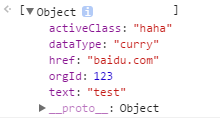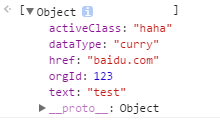JSON.parse(),JSON.stringify(),jQuery.parseJSON()的用法
1. JSON.parse(jsonString): 在一个字符串中解析出JSON对象(js方法)
|
1
2
3
|
var str = '[{"href":"baidu.com","text":"test","orgId":123,"dataType":"curry","activeClass":"haha"}]';JSON.parse(str); |
结果:

2. JSON.stringify(obj) : 将一个JSON对象转换成字符串
|
1
2
3
|
var obj = [{"href":"baidu.com","text":"test","orgId":123,"dataType":"curry","activeClass":"haha"}];JSON.stringify(obj); |
结果:
|
1
|
"[{"href":"baidu.com","text":"test","orgId":123,"dataType":"curry","activeClass":"haha"}]" |
3. jQuery.parseJSON(jsonString) : 将格式完好的JSON字符串转为与之对应的JavaScript对象 (jquery 方法)
|
1
2
3
|
var str = '[{"href":"baidu.com","text":"test","orgId":123,"dataType":"curry","activeClass":"haha"}]';jQuery.parseJSON(str); |
结果:

4.JSON.parse()和jQuery.parseJSON()的区别:
JSON.parse()是js方法,jQuery.parseJSON()是jquery方法有的浏览器不支持JSON.parse()方法,使用jQuery.parseJSON()方法时,在浏览器支持时会返回执行JSON.parse()方法的结果,否则会返回类似执行eval()方法的结果,以上结论参考jquery 1.9.1 得出:
|
1
2
3
4
5
6
7
8
9
10
11
12
13
14
15
16
17
18
19
20
21
22
23
24
25
26
27
28
29
30
31
32
33
34
35
|
parseJSON: function( data ) { // Attempt to parse using the native JSON parser first if ( window.JSON && window.JSON.parse ) { return window.JSON.parse( data ); } if ( data === null ) { return data; } if ( typeof data === "string" ) { // Make sure leading/trailing whitespace is removed (IE can't handle it) data = jQuery.trim( data ); if ( data ) { // Make sure the incoming data is actual JSON // Logic borrowed from http://json.org/json2.js if ( rvalidchars.test( data.replace( rvalidescape, "@" ) .replace( rvalidtokens, "]" ) .replace( rvalidbraces, "")) ) { return ( new Function( "return " + data ) )(); } } } jQuery.error( "Invalid JSON: " + data );}, |




 浙公网安备 33010602011771号
浙公网安备 33010602011771号